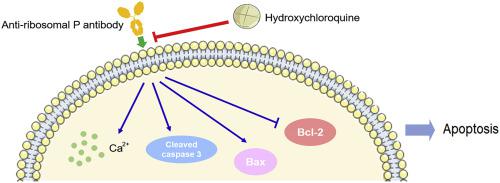Journal of Neuroimmunology ( IF 2.9 ) Pub Date : 2021-06-29 , DOI: 10.1016/j.jneuroim.2021.577648 Xinnan Zhao 1 , Pingting Yang 1

|
Systemic lupus erythematosus (SLE) is a chronic autoimmune disease characterized by a wide spectrum of autoantibodies, among which anti-ribosomal P (anti-P) antibodies are considered to be closely related to the neuropsychiatric SLE (NPSLE). Hydroxychloroquine (HCQ) has been proven to be effective against a variety of autoimmune diseases and is an essential drug for the treatment of SLE. In this study, we investigated the effects of anti-ribosomal P (anti-P) antibodies on neural cells and determined whether hydroxychloroquine (HCQ) influenced the anti-P antibodies-induced changes. The results showed that the binding of anti-P antibodies with mouse neuroblastoma- 2a (N2a) cells and rat primary neurons resulted in elevated intracellular calcium levels, inducing decreased cell viability and cell apoptosis. These inhibitory effects were alleviated by HCQ in a concentration-dependent manner by reducing the intracellular calcium levels and modulating the expression of apoptotic proteins. In summary, our study demonstrates that anti-P antibodies induce neural cell damage. HCQ could ease the damage effects and may play a neuroprotective role in NPSLE.
中文翻译:

羟氯喹减轻抗核糖体 P 抗体诱导的神经毒性
系统性红斑狼疮(SLE)是一种以自身抗体谱广为特征的慢性自身免疫性疾病,其中抗核糖体P(anti-P)抗体被认为与神经精神性SLE(NPSLE)密切相关。羟氯喹(HCQ)已被证明对多种自身免疫性疾病有效,是治疗 SLE 的基本药物。在这项研究中,我们研究了抗核糖体 P (anti-P) 抗体对神经细胞的影响,并确定了羟氯喹 (HCQ) 是否影响了抗 P 抗体引起的变化。结果表明,抗 P 抗体与小鼠神经母细胞瘤-2a (N2a) 细胞和大鼠原代神经元的结合导致细胞内钙水平升高,导致细胞活力降低和细胞凋亡。HCQ 通过降低细胞内钙水平和调节凋亡蛋白的表达,以浓度依赖的方式减轻了这些抑制作用。总之,我们的研究表明抗 P 抗体会诱导神经细胞损伤。HCQ 可以缓解损伤效应,并可能在 NPSLE 中发挥神经保护作用。











































 京公网安备 11010802027423号
京公网安备 11010802027423号